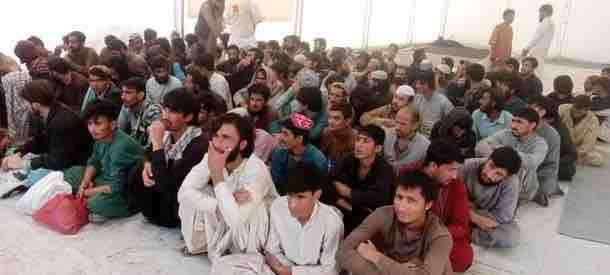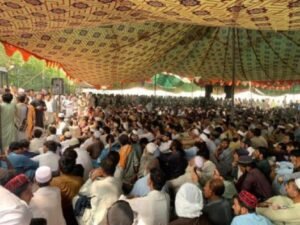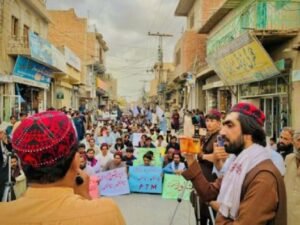Political and Economic Considerations Outweigh Inhumane Deportation of Afghans

Afghan returning refugees from Pakistan to Afghanistan. Photo: @MoRR Ministry of Refugees and Repatriation of Afghanistan
By Kadeem Baloch
The deepest cut for the Afghans being evicted after long years of living as refugees registered or otherwise, in Pakistan is being extorted by the Pakistani authorities that have slapped a USD 830 “Exit Tax” per person.
The state is in denial of the departing Afghans’ being targeted by locals on racial counts and for extortion of their belongings as they are forced out. To justify its action, it has raised the bogey of the Afghan refugees being responsible for terror attacks, thus scapegoating all refugees.
The media is pointing fingers at the world community’s ‘lethargy’ as an editorial in Dawn newspaper on December 3, 2023, put it, for failing to aid and finance the eviction. “The US, UK, Germany and other Western states that participated in the Afghan invasion have a duty to swiftly resettle all Afghans who helped them,” Dawn observed, hinting that they were too busy with the Gaza conflict.
Over 330,000 Afghans have crossed the border into an uncertain world that they either do not know or fear returning to where temperature touches minus four degrees Celsius during winter.
Two petitions are awaiting before the Supreme Court of Pakistan. Domestic protests and global concerns, worsening security situation and adding to its deepening economic crisis have not deterred Pakistan’s army-backed government from evicting thousands of Afghans.
The refugees were asked to return by December 1 in a sudden move. The crackdown was initially aimed at the 1.73 million refugees without legal documentation. But despite earlier official assurances that legal residents will not be deported, even those with proper documentation are facing forced repatriation.
Thousands forced out of their Pakistani homes are in “holding centers” awaiting an eviction they do not want and dread. Lawyers, journalists, and even the United Nations High Commissioner for Refugees are denied access to these “holding centers”. Media reports say refugees are herded into buses and cargo containers. They are also barred from carrying cash exceeding 50,000 Pak rupees, or around $175, per family or taking their cattle and other belongings.
Concerned citizens and rights bodies have argued before the Supreme Court urging it to declare that Afghan children, who were born in Pakistan, are entitled to the country’s citizenship under section 4 of the Pakistan Citizenship Act, 1951.
Analysts say any court directive, like the process of eviction itself, is difficult to implement without adversely hurting the lives of the hapless. The Dawn editorial ruefully recalls that the Vietnamese in the last century and recently, the Iraqis had faced similar situations, but the concerned governments had acted to repatriate them. In the Afghans’ case, procedural delays had been stalling this. These countries delayed visas even for repatriating Afghans who served them during 2002-2021, and who were awaiting being taken out of Islamabad.
“For Pakistan, political and economic considerations outweigh inhumane deportation of refugees,” Abdullah Zahid writes (November 28, 2023) in a syndicated article after speaking to several analysts and opinion-makers.
The all-powerful Pakistan Army is seen as behind the move, taking advantage of an interregnum with a caretaker government in office and the political class preparing to participate in as-yet national elections.
The army-led ‘establishment’ wants to ‘settle’ to its advantage the contentious Durand Line that forms the British-era drawn Afghanistan-Pakistan border straddled by the ethnic Pushtuns. It is using the opportunity to rid itself of Afghans who have poured in each time there is turmoil and do not return.
The Pakistan government remains mum on how it will effectively manage the exit of such a large number of refugees. Neither are there any answers to whether the Taliban government will accept those who have lived in Pakistan for generations.
“Evicting Afghans is as difficult as the Palestinian issue,” says Ayesha Siddiqa, Pakistani security analyst now based abroad. The similarity, however, is only prompting the ‘establishment’ to push the developments in Gaza into media and public discourse to divert the issue of the Afghans’ eviction, besides economic woes and the social tensions that it has generated.
The author chooses a pseudonym. Kadeem Baloch is a freelance journalist based in Pakistan.
Note: The contents of the article are of sole responsibility of the author. Afghan Diaspora Network will not be responsible for any inaccurate or incorrect statement in the articles.





